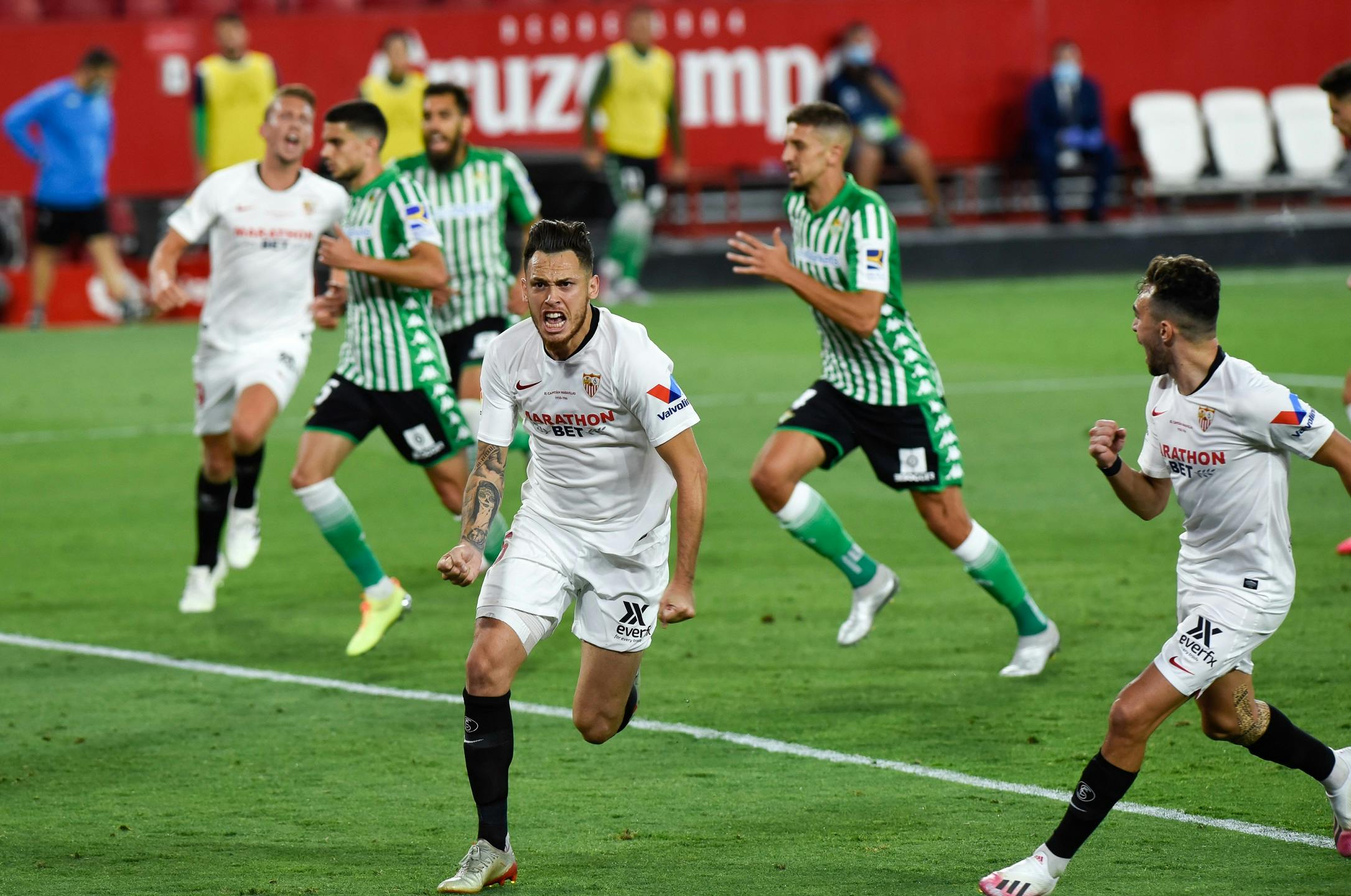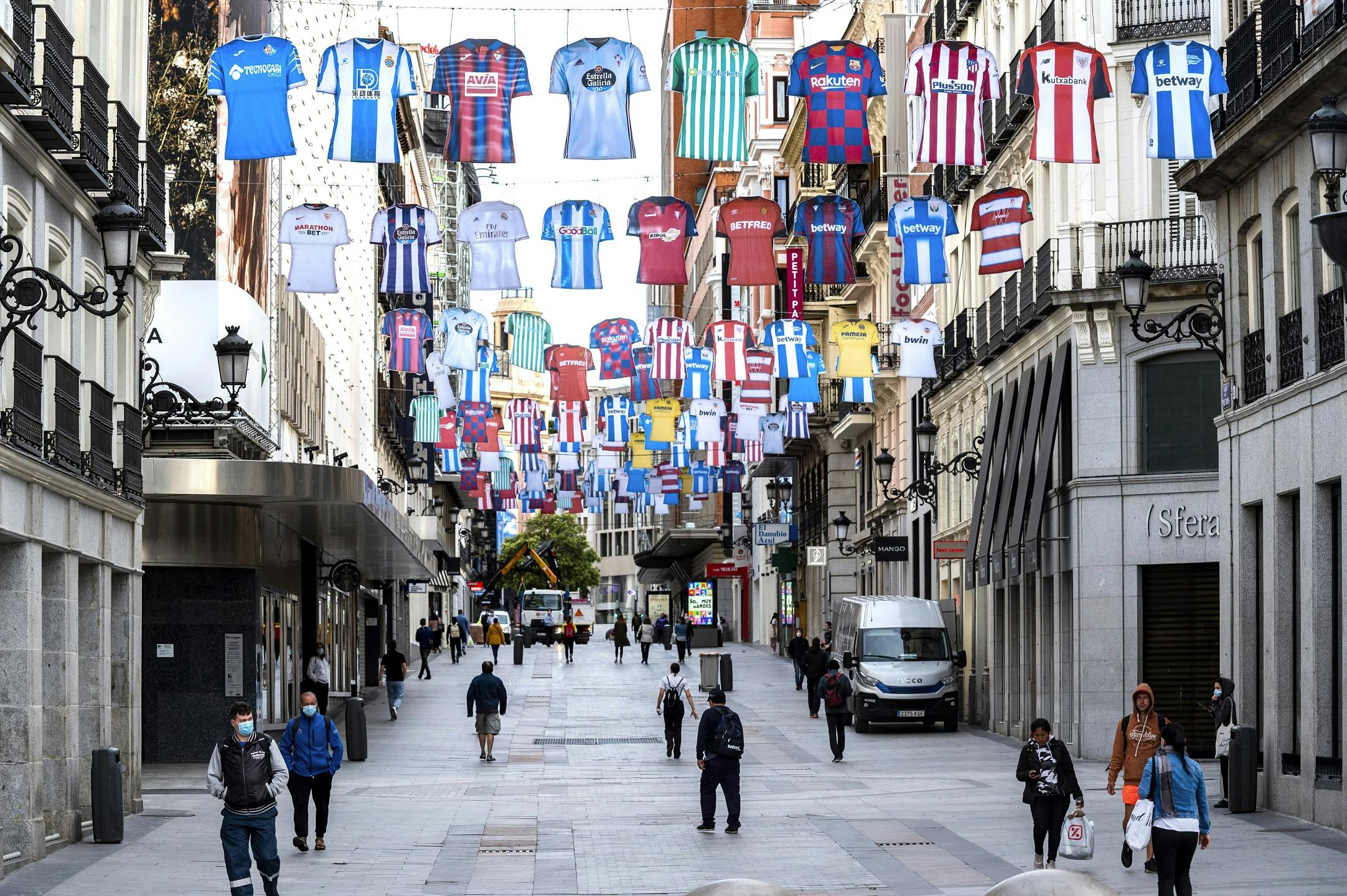El Gran Derbi, the clash of Seville’s Laliga clubs FC Sevilla and Real Betis is always a fixture that stirs the blood in a soccer-mad city.
But Sevilla’s 2-0 victory against their neighbours on June 11 had a significance which extended beyond the city to an expectant and excited world.
The match, played out in front of empty tribunes at Sevilla’s 42,000 capacity Ramon Sanchez-Pizjuan stadium, was the first LaLiga fixture to be played since the competition was postponed on March 12 because of the coronavirus pandemic which went on to kill more than 27,000 people across Spain, where death rates peaked at nearly 1,000 per day.
Spain was one of the first European countries to be brutally affected by the pandemic and the government-ordered lockdown was among the most comprehensive and restrictive. In the midst of the biggest medical and economic crisis in living memory, sport may not have been a top priority for national or local politicians, but despite the lack of on-field action, LaLiga and its clubs stepped up to use their profile and influence within their communities to make a real difference during the crisis, and support medical initiatives while investigating all options for the eventual return.
Supporting communities and medical efforts
With football accounting for 1.37 per cent of Spain’s gross domestic product (GDP) and some 185,000 jobs, plotting a course for a return was vital not only for the competition itself but to the national economy.
But while planning for a return continued amid the ever-changing backdrop of the pandemic, LaLiga and the clubs got to work using digital media and social channels to maintain their links to fans, and driving projects to help their communities at their time of greatest need.
Under the campaign banner #LaLigaSeJuegaEnCasa (LaLiga is played at home) a range of initiatives were rolled out. Players and coaches used club channels and social media to share their health and fitness regimes during lockdown, clubs played a series of virtual fixtures on FIFA 20 and LaLiga itself embarked on a range of ambitious, engagement-driven digital projects in conjunction with partners.
Spanish esports commentator and influencer Ibai Llanos inspired one of the most remarkable initiatives. Within three days of him Tweeting an idea for an e-sports football competition contested by first team players from LaLiga clubs, 18 had signed up and his idea had become a reality. Drawing on their extensive experience of the e-sports world, LaLiga’s digital team worked to deliver a competition which entertained millions on Twitch, through LaLigaTV and social media channels, and via international broadcast partners.
The event raised more than €900,000 to help fund UNICEF’s effort to combat Covid-19.
Elsewhere, a further €1m was raised as a result of LaLigaSantander Fest, a virtual global charity festival held to entertain a locked-down population and support the medical effort.
50 million people watched an event designed to bring music and football together, and the festival featured artists including Alejandro Sanz, David Bisbal, Luis Fonsi and Lang Lang – performing from their homes – as well as appearances by LaLiga stars. The event was organised by LaLiga and made possible thanks to the collaboration of Banco Santander, Universal Music, management firm GTS, LaLiga players and clubs, and a host of the competition’s sponsors.
LaLiga clubs and their players also devised and implemented a plethora of innovative schemes to help their communities during the epidemic. FC Barcelona put its Camp Nou stadium and surrounding complex at the disposal of the local health authorities and instigated a programme to support the elderly through the crisis. Likewise, Real Madrid made the Santiago Bernabeu Stadium available for the distribution of medical supplies as well as making a significant financial donation to UNICEF.
Second-tier club RC Deportivo joined forces with RC Celta to actively promote a vital blood donation campaign while many other clubs directed their resources towards funding vital medical and protective equipment and contributing to community food banks.
Key steps to return
While clubs, players and the league continued to support their communities, LaLiga worked closely with the Spanish and regional governments and health authorities to plan for a restart. Having said that cancellation of the season was not an option, President Javier Tebas was determined to share insight and learn from the experiences of other major leagues as intricate protocols were developed to safely bring players back to training and for areas such as travel and security to be managed ahead of the restart.
The return of LaLiga was orchestrated to build excitement and create a splash around the world. Under the banner #BackToWin, the league put together a series of 160 national and international initiatives including digital and in-person events, media campaigns, prize draws, competitions and influencer campaigns. Activities also included exhibitions of LaLiga club kits hanging above Spanish cities, projecting fan photos onto iconic buildings using video mapping and urban art exhibitions in 12 cities across the world.
“These initiatives covered five continents which strengthens LaLiga’s global image. They help us tell our fans that we’re #BackToWin and we’re counting on them. The return of LaLiga is a moment that so many have waited a long time for and we’re going to celebrate it in style,” said Óscar Mayo, LaLiga’s director of business, marketing and international development.
Among the initiatives was an urban art project in 12 cities across five continents, including Mexico City, São Paulo, Lagos, Hong Kong, London and Paris. These artworks, displaying the colours and values of the competition, are designed to unite different countries and cultures through football and LaLiga.
Major companies and partners of LaLiga also supported the return, such as Banco Santander, Puma, EA Sports, Budweiser, Rexona, BKT, LiveScore, El Corte Ingles, Samsung, Panini, Deliveroo, Allianz, STIHL, Mazda, Danone, Marques del Atrio, VITALDENT, Mail Boxes and RENFE.

Enhancing the TV experience
With no fans allowed in stadia, LaLiga faced the prospect of some of the world’s greatest players performing in empty echoing bowls, which for TV viewers promised an experience entirely at odds with the colourful, intense and noisy atmosphere which has become one of the hallmarks of top-level Spanish football.
Eager to provide as close to a normal experience as possible, LaLiga worked with Norwegian company VIZRT to develop virtual stands which feed graphics into the broadcast feed to deliver a representation of fans in home team colours.
Virtual stands and fans are complemented by an Atmospheric Audio feed. Produced from LaLiga’s audio library in collaboration with EA Sports’ FIFA, LaLiga’s official sponsor, the sound reflects the real-life reaction of the crowd to events on the pitch from a goal to a near-miss or foul.
Supporting Spain and its tourist industry
The return of LaLiga also provided an opportunity to use LaLiga’s global reach and influence to boost Spain’s massively important tourism industry and associated business sectors. Working with the government and Confederation of Employers and Industries of Spain (CEOE), LaLiga launched a campaign to promote Spain as a destination for safe sport and tourism powered by the #SpainAwaitsYou hashtag, which featured on-screen on match coverage broadcasts worldwide.
As an entertainment platform which reaches a cumulative audience of more than 2.7 billion globally, LaLiga, which is an element of ‘Brand Spain’, gives worldwide visibility and delivers a clear message that just as football is back in business, Spain’s door is open to visitors.
Immediate Impact
Figures from international consultants Nielsen Sports show that LaLiga’s meticulous planning and creative approach to re-launching its season had paid-off with international viewing figures up by more than 48% on the first matchday (Matchday 28) after the competition resumed.
Some regions of the world saw extremely sharp increases in viewing figures on the first matchday after the restart. For example, in Africa there was a rise of over 73%, while in specific countries such as South Africa the increase amounted to more than 210%.
In Asian countries such as India, where LaLiga is broadcast on Facebook, an increase of over 72% was detected.
In Europe, the upturn was over 56%, with countries such as Belgium (over 130%) and Denmark (over 46%) of particular note.
Mayo said: “We’re very pleased with the exponential growth in the figures for LaLiga’s international audience. We knew that fans around the world were keen to enjoy the excitement and entertainment we offer. Achieving a rise of almost 50% in our international audience is a reflection of the hard work put in by our international broadcasters, the clubs and the competition itself over these last few months.”
